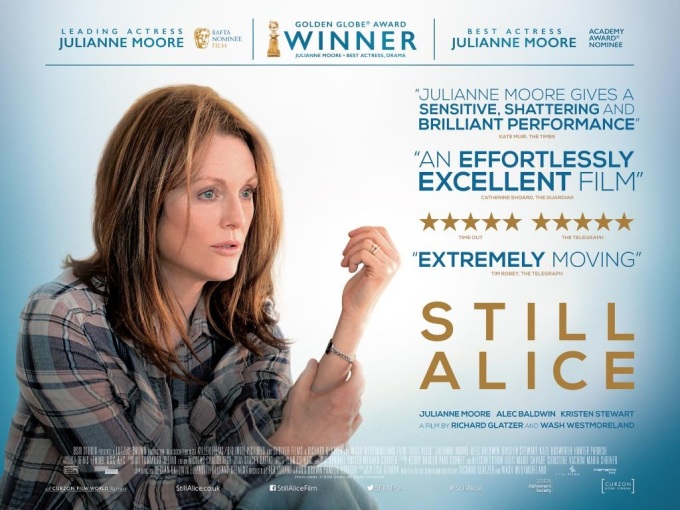"I can see the words hanging in front of me and I can't reach them and I don't know who I am and I don't know what I'm gonna loose next."
It’s safe to say that Julianne
Moore has been massively successful on nearly every level of her career. Just
to give one example, she’s arguably the standout of PT Anderson’s Magnolia, a
film that features Tom Cruise, Phillip Seymour Hoffman, William H Macy and John
C Reilly. And that was just a supporting role. Here she takes up the lead role
to give one of the most beautiful and haunting performances of recent memory.
A linguistics professor Alice
Howland (Moore) who has recently turns fifty and is happily married as well as
being a mother of three suddenly has her life turned upside down when she
begins to suffer from memory lapses. These symptoms are diagnosed as early
signs of Alzheimer’s disease and now she has to try and retain her own identity
and memories.
There’s also no denying that this
film was always going to raise delicate subjects. Moore’s performance has to
cover many things here, as well as the various stages of the disease she gives
us a picture of a proud and intelligent woman. These early impressions that she
expertly exudes only make it more heart-breaking as her mind itself is compromised.
It’s also a very subdued portrayal of the character, diving straight into the
role but not to the extent of being flashy and over the top. It’s quiet for a
majority of the film, and that’s what makes it so spectacular in its own way.
While it’s rare for this disease
to affect someone this young it’s not unheard of. Here we see a bleak version
of events and the repercussions from almost every angle. Not only is there the
issue of her own mind decaying, but there’s a 50/50 chance that her children
will inherit the disease from her as well. The tragedy of it is highlighted as
Alice could not have seen this coming, as her own mother dies when she was young.
The family that surrounds her are
also portrayed expertly and combined with the excellent writing they do feel
genuine. Alec Baldwin as Alice’s husband John is a prime example. Too many
films with a similar premise involve the spouse leaving their partner as they
encounter difficulties. Here Baldwin stays with her throughout and is
supportive, like a genuine person who cares and will do what someone who loves
a person would do. This is also the best performance I’ve ever seen from
Kristen Stewart.
There’s a great precision and
sensitivity to this screenplay as well. There are very few false steps and because
the majority is so good one could almost forgive it for those few times that it
does. But it does occasionally, for a start there are some repetitive moments
in the film, and I understand that it does need to create that effect to hammer
the message across, but sometimes it feels as if they’re using a sledgehammer
to do it. There’s also one oddly redundant scene in which Stewart’s character
performs a Chekov play).
But I am nit-picking here. It
would be easy to forget, amid the amazing performances, that there are also
some impressive directorial techniques on display here from Wash Westmoreland
and Richard Glatzer. The use of spinning cameras and blurred images make the
deterioration of Alice’s brain a cinematographically impressive spectacle. As
the film, and the condition, progresses these effects also progress in a
similar fashion, just in case you had any doubts over the severity of this
situation.
The end of this film is also
emotionally ambiguous, not to give anything away. I do love a film that has the
confidence to not manipulate the viewer over what to feel at the end, instead
you can decide what emotional level the end result of Alice’s journey reaches.
So not only is this the
performance of Julianne Moore’s career but it also proves to be emotionally
resounding and deeply thoughtful thanks to an incredible screenplay and interesting
direction.
Result: 9/10

No comments:
Post a Comment